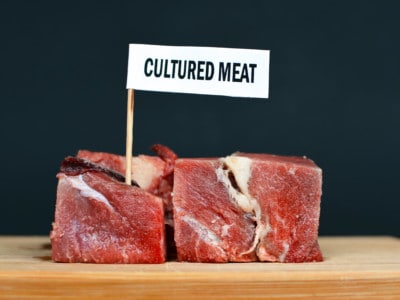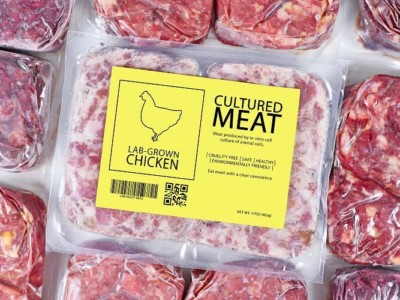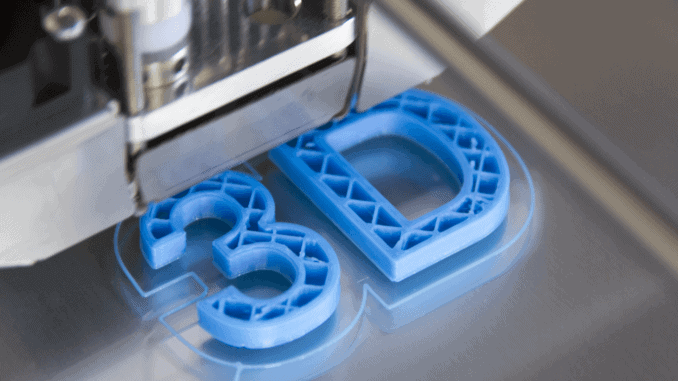Plant-based alternatives to meat and dairy products have had huge success in recent years, and seafood replacements may not be far behind. Companies like BlueNalu and Good Catch are providing tasty seafood alternatives to the market, along with the all-female company, Modern Meat, now producing plant-based seafood.
Cultivated, Cell-Cultured & Biotechnology
Cellular products (or in general, cellular agriculture) for food applications offer the potential to meet the increasing global demand for meat products in times of rising food security issues due to climate change. Animal products harvested from cell cultures are exactly the same as those harvested from an animal; the only difference is how they are made.
read more
Cellular agriculture focuses on the production of agricultural products from cell cultures using a combination of industrial biotechnology, tissue engineering, molecular biology, and synthetic biology to create and design new methods of producing animal protein, fats, and tissues that would otherwise come from traditional animal agriculture. Thereby, cellular agriculture is defined as the science of agriculture, in that animal cells are harvested and propagated by pigs, chickens or cows in an ethically justifiable way, instead of breeding and killing the entire animal.
[caption id="attachment_56620" align="alignnone" width="2560"]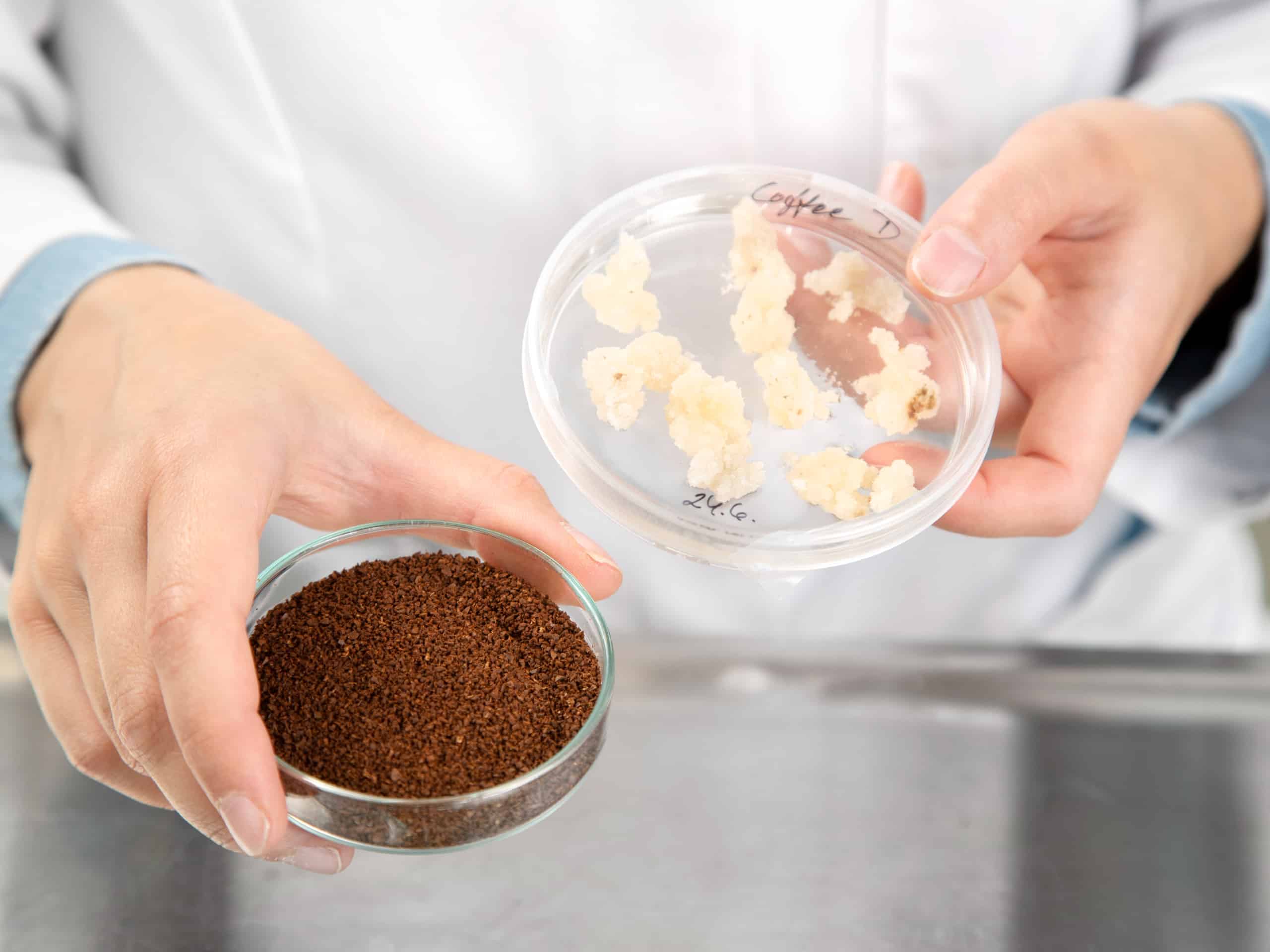 ©VTT Research[/caption]
©VTT Research[/caption]
Using cell culture technology to develop high-quality food products from particular species of animals has sparked a discussion on whether cultivated meat can be considered to become a viable alternative to animal meat in global food production. After years of research, science has succeeded in developing cellular agriculture products, mostly cultivated meat and dairy products, that are potentially going to transform the global food system and the way we are producing animal products in the long term.
Cultured meat companies use cellular agriculture to develop agricultural products like cultured chicken meat or ground meat. Israeli cell-cultured meat company Peace of Meat, recently acquired by MeaTech 3D, became the first company to produce over half a kilogram of cultured chicken fat biomass in a single production run. The most significant producer of cultured meat is US-based Memphis Meats that closed the largest funding round in the history of the cultured meat industry.
Cultured Meat as an Alternative to Animal Agriculture
Scientists and industry experts often point out that the way in which the traditional food industry is handling production of animal products on industrial farms is extremely unnatural. Cultivated meat, despite using stem cells from an animal to produce meat in a lab, is natural when produced using natural ingredients such as beta-carotene from carrots and omega-3 fatty acids from algae. Moreover, cellular agriculture opens up new opportunities for farmers, as they could join the newly established cultured meat industry in raising a few animals and use their cells to produce their own cultivated meat, eliminating concerns about human health and the product’s origin.
Cellular Agriculture to Replace other Animal Products
As cellular agriculture is not limited to cultured meat, other companies operating in the cellular agriculture field are working on cell-based dairy products, including Singapore’s TurtleTree that is moving its clean milk featuring real milk proteins ever closer to market. However, while Singapore became the first country to grant regulatory approval to a cultured meat company, it will take time for cell-based whole milk to gain regulatory approval.
Apart from cultured meat and cell-based dairy products, US-based California Cultured is utilizing cellular agriculture to produce cocoa products like cocoa powder, chocolate, and cocoa butter in order to circumvent the serious issues arising from cocoa production such as deforestation and child slave labor, highlighting the versatile applications for cellular agriculture.
[caption id="attachment_47793" align="aligncenter" width="670"]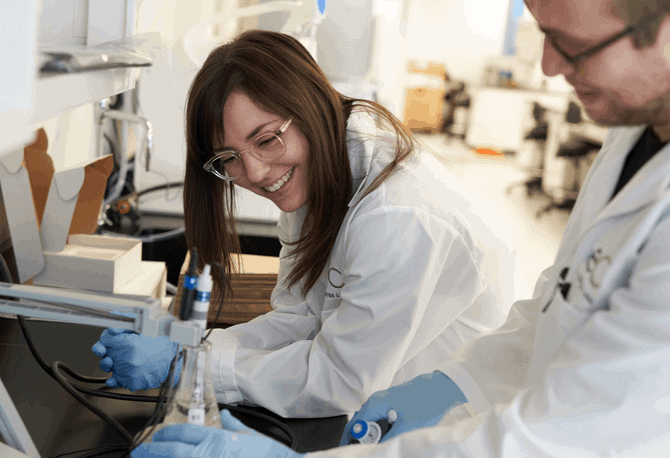 © Future Fields[/caption]
© Future Fields[/caption]
Market Potential of Cellular Agriculture Products
While plant-based alternatives to meat and dairy products have seen great success over the past years without the need for any animal protein, a vast majority of the meat-eating population is still demanding real animal proteins. Therefore, cultured meat could become a game-changer for meat lovers around the world. Moreover, the plant-based food industry is already showing interest in cellular agriculture, as a survey released by Peace of Meat, a B2B supplier of cultivated fat, revealed that up to 68% of plant-based meat producers would be willing to incorporate cultivated fat into their products.
The importance of cellular products can further be attributed to changing needs of consumers. A vast majority of consumers demands healthier grown agricultural products with fewer chemicals and antibiotics, releasing fewer greenhouse gas emissions to ensure sustainable food production. Focusing on food safety and human health, as well as animal welfare and sustainability, cultivated animal products could shift from being a luxury food in 2021 to an important future food, feeding industrial countries as well as developing countries across the globe.
Benefits of Cellular Agriculture
Emphasizing the benefits of cellular agriculture, scientists claim that cellular agriculture products are using less agricultural land and natural resources like water. As produced by extracting once-living cells from animals to multiply them in a controlled environment, cellular agriculture is often referred to as a path to achieving food safety in the global food industry. Cell culture technology further decreases pollution when compared to traditional farming.
Financial advantages can be achieved through cellular agriculture in the long run, as a more controlled production can not only save money, but also provides consistent product quality. Cellular agriculture can further boost animal welfare, as it provides clean meat without animal suffering. Moreover, multinational companies are increasingly turning to cell based: Cargill, for example, invested in cultured meat company Aleph Farms and fast-food giant KFC signed an agreement with Mosa Meats to secure the company’s cultured chicken meat as soon as it becomes commercially available. Such commercialization will allow for competitive pricing.
An outlook on the future of cellular agriculture
Studies suggest that whenever cell-based meat gets to the grocery store, assuming it has price parity and, of course, great taste, consumer acceptance will be high, especially among gen Z and millennials. However, most customers are not yet familiar with the concept of growing meat from stem cells and have no idea about the actual processes behind terms like tissue engineering and synthetic biology, as well as how cellular agriculture could contribute to a more advanced food industry.
In this context, the production process of cultured meat is called “cellular agriculture” in order to emphasize the naturalness of the product and to counteract the image of artificial meat production in test tubes under laboratory conditions. Cellular agriculture thus is perceived to be a more customer-friendly term, aiming to increase consumer acceptance for cell-based products.
Cellular agriculture is a relatively new discipline, a futuristic way of agriculture using just a tiny fraction of agricultural land compared to the production of animal products in the traditional way. With increasing health and environmental awareness and global trends such as the vegan movement permanently changing eating habits, a future in which cellular agriculture gains momentum can be seen as a desirable path to feed a growing population with food products derived from cell cultures.
Clarification for Earlier Article on Cultivated Bacon and More on Cultivated Meat Market
In an earlier article about Higher Steaks, a leading UK food tech company, we said the company had revealed “the world’s first cultivated bacon and pork belly”. We have since been contacted by Mission Barns, another food technology company, kindly letting us know that it had unveiled its cultivated bacon earlier this year.
Clarification for Earlier Article on Cultivated Bacon and More on Cultivated Meat Market
In an earlier article about Higher Steaks, a leading UK food tech company, we said the company had revealed “the world’s first cultivated bacon and pork belly”. We have since been contacted by Mission Barns, another food technology company, kindly letting us know that it had unveiled its cultivated bacon earlier this year.
Higher Steaks Develops World’s First Cultivated Bacon and Pork Belly Products
Higher Steaks, a leading food technology company in the UK, yesterday revealed the world’s first cultivated bacon and pork belly, establishing the Bristol-based company as the market leader in the cultivated pork sector. We spoke with founder Benjamina Bollag and Head of R&D Dr. Ruth Helen Faram about pioneering this breakthrough.
Higher Steaks Develops World’s First Cultivated Bacon and Pork Belly Products
Higher Steaks, a leading food technology company in the UK, yesterday revealed the world’s first cultivated bacon and pork belly, establishing the Bristol-based company as the market leader in the cultivated pork sector. We spoke with founder Benjamina Bollag and Head of R&D Dr. Ruth Helen Faram about pioneering this breakthrough.
Germany’s Opportunity to Prevent Future Meat Scandals by Becoming a Leader in Cultivated Meat
The large German slaughterhouses repeatedly hit the headlines because of their working conditions, especially during the corona crisis. A scientific paper, written at WHU – Otto Beisheim School of Management, shows how Germany could avoid this and become an international leader in this sector in the coming years.
3D Printed Vegan Burgers
The Israeli food technology start-up “Chef-It” is, according to its own statements, about 18-24 months away from producing its own plant-based burger. However, the company is not doing this in the conventional way – instead, it is using 3D printers. With a specially developed technology based on cellulose, all the necessary ingredients can be imitated and made into burgers using a 3D printing process.



